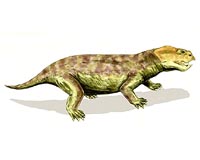| . |  |
. |
Christchurch, New Zealand (AFP) May 20, 2011 "You're a bit grumpy aren't you mate," says conservationist Shirleen Helps as she expertly handles a squawking penguin doing its best to peck her unprotected fingers. The tiny bird, angry at the indignity of being transported in a cat box, was found starving and malnourished at a penguin colony on Helps' property, where the population has fallen dramatically this year as changing weather patterns have reduced fish stocks. Helps found a place for her reluctant passenger, nicknamed Morgan, at a penguin refuge in Christchurch but says hundreds more Little Blue Penguins have died at the colony on the east coast of New Zealand's South Island. The Little Blue, also known as the Fairy Penguin, is the smallest of the world's penguin species, measuring about 25 centimetres (10 inches) tall and weighing one kilogram (2.2 pounds). "This year's been a terrible year, we've had big starvation issues at sea," said Helps. "A lot of chicks have starved to death before we could actually help them, then the adults started getting into trouble and started ending up too skinny to get the through the moult and this one was one of those... we've probably lost 80-90 percent of the chicks this year." New Zealand's Department of Conservation (DOC) says the culprit is La Nina, a weather pattern characterised by unusually cool ocean temperatures in the central and eastern tropical Pacific. UN scientists have linked La Nina to recent episodes of extreme weather around the globe, including flooding in Australia and drought in East Africa and the western seaboard of South America. DOC says it has also had an impact on New Zealand's penguins, predicting thousands of birds could die this year as the most severe La Nina in 25 years reduces the schools of baitfish upon which they depend. "Calm seas stop the mixing of water columns making it harder for seabirds to find food," DOC vet Kate Mcinnes said. "Any seabird that relies on fish will struggle." Autopsies completed this month on the bodies of 18 penguins found washed up on New Zealand shores found none had food in their stomachs and they died from starvation and exposure. While New Zealand's 50,000-plus Little Blue Penguin population is expected to recover from the La Nina-induced fish shortage in the long term, experts say they also face threats from feral animals and habitat destruction by humans. The refuge where Morgan found a home, located in Christchurch's International Antarctic Centre, cares for 24 penguins that have been injured and would have no chance of surviving in the wild. "Most of them have broken or paralysed flippers, some have eating disabilities so I have to assist them, others have broken beaks," penguin keeper Mallorie Hackett said. Inhabitants include Elvis, who is completely blind and locates his food by following the rustle of the fish bucket on his enclosure's gravel, and Bagpipes, a one-legged penguin who sports a modified neoprene beer cooler to keep his stump dry. Helps, who runs eco-tours at the colony on her property, said the refuge provided an important service by housing injured birds. "The best option is to release them into the wild in good condition," she said. "(But) it's always good to know one's in good care. It's hard releasing them into the sea when you don't think they've got much chance."
Share This Article With Planet Earth
Related Links Darwin Today At TerraDaily.com
 Ancient furry mammals had big brains for smell
Ancient furry mammals had big brains for smellWashington (AFP) May 19, 2011 Skull scans on two of the oldest known mammal species have shown their brains were large and well-developed in areas that promote a strong sense of smell, scientists said on Thursday. Researchers believe the mammalian brain evolved in three stages - first the boost in sense of smell, then the ability to touch and feel through body hair, and finally the brain coordination to produce "skilled ... read more |
|
| The content herein, unless otherwise known to be public domain, are Copyright 1995-2010 - SpaceDaily. AFP and UPI Wire Stories are copyright Agence France-Presse and United Press International. ESA Portal Reports are copyright European Space Agency. All NASA sourced material is public domain. Additional copyrights may apply in whole or part to other bona fide parties. Advertising does not imply endorsement,agreement or approval of any opinions, statements or information provided by SpaceDaily on any Web page published or hosted by SpaceDaily. Privacy Statement |